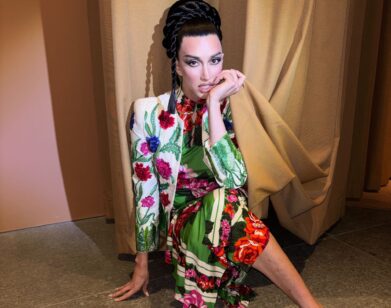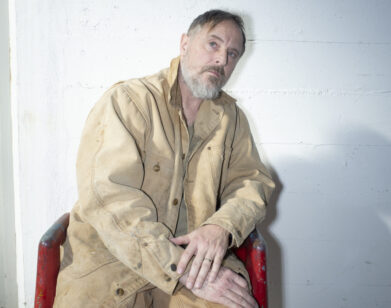Saturday Screening: Adrian Williams’ Bat Song

Still from Adrian Williams’ “Albatross Ado,” screening at APF Lab March 21.
Adrian Williams is busy rehearsing at the moment. Well, it’s the rehearsal before the rehearsals. The Portland-born, Cooper Union-educated artist has a new audio play, “Bat Song,” prestented by Art Production Fund and Cay Sophie Rabinowitz, and opening at APF Lab tomorrow afternoon. There will be a rehearsal performance each day from March 8–17, an assembly of digressive stories—narrated by her, accompanied by instruments and song—that meet not at the end but somewhere in the middle. Hopefully. Each rehearsal—there are ten days of rehearsals before the public—will encompass two or three parts of the whole script. Though live, it’s not quite a musical performance, and not quite a play. It’s one script, though not quite a whole. And there’s also something called the Nested Loop, not to mention upside-down singing.
FAN ZHONG: How are the rehearsals going?
ADRIAN WILLIAMS: Well. I think we’ll have to work through the night tonight to get ready for the first performance tomorrow, but I think we’ll be fine.
FZ: So this is an audio play?
AW: Yes, it is. There is an instrumentalist, a sound guy, a gymnast, and a vocalist. I will be narrating and conducting the piece. But the format is very nontraditional. It is non-chronological; everyone will have separate instructions and we will try and meet in the middle, so to speak.
FZ: And the story is about a vocalist.
AW: It’s about a vocalist who believes she has a problem with her voice. The voice as a tool isn’t something we can build or repair. It’s a psychological space—and she feels she’s not at her peak. She is trying to fix something and she doesn’t know if it’s broken. She’s very insecure, and she gets a referral to an obscure doctor on 72nd St.
FZ: It sounds like a borrowed true story.
AW: [LAUGHS] No no, it’s not.
FZ: So what happens when she visits the doctor?
AW: In the doctor’s office, the vocalist undergoes a hypnotic process called the “Nested Loop.” In the Nested Loop, a story is told, and as that story is told, another story is told that is connected to the first story-and so on, and so on.
FZ: A bit like an exquisite corpse method …
AW: I’m not sure what that is.
FZ: It’s a storytelling method where one person starts a story, and then a collaborator picks up where he left off, and then another…
AW: Yes, except in the “Nested Loop” process you enter the story and exit at the same place. You climb back out in reverse order; so you begin with story one, two, three—then you exit three, two, one. You reach a point in your head where you’re no longer trying to control things. It’s about letting go.
FZ: And in each story—or stage, I suppose—there will be a clue that will help the vocalist?
AW: That’s the idea. I’m trying to adapt this form of storytelling into sound. Each day of the performance we’ll do two or three scenes from the audio play. Each day will be different.
FZ: And does this process eventually resolve her issues with her voice?
AW: The doctor recommends that she sing upside down. That becomes her solution.
For a full schedule of rehearsals, go to artproductionfund.org. Additionally, on March 21, APF will screen her short film, “Albatross Ado,” with a soundtrack performed live by Ted Koehler. Happily, it’s about a house being carried through a small town. APF Lab is located at 15 Wooster Street, New York.






